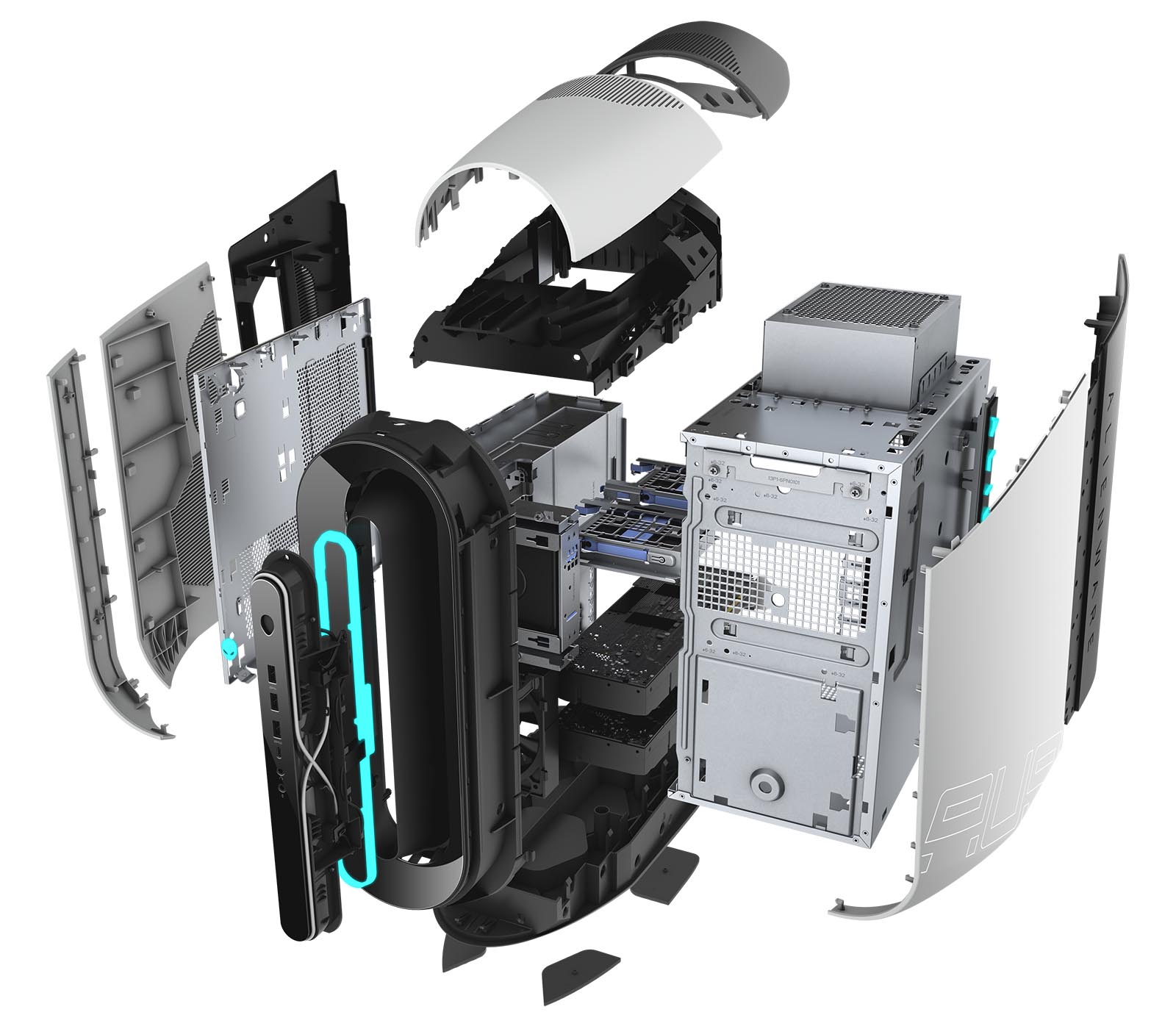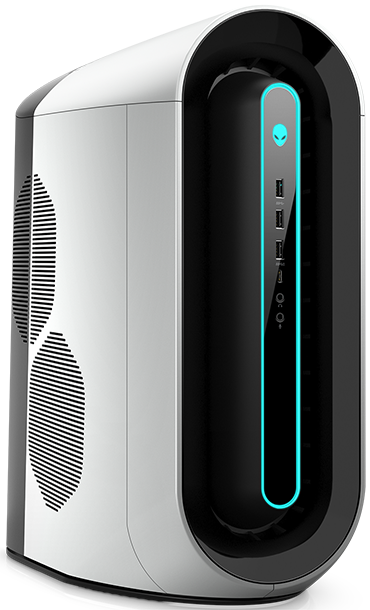To fully enjoy a PC-based VR experience, you need a computer that has particular hardware that can meet specific performance requirements. If you don't want to go through the hassle of building an entirely new PC to get there, we've rounded up some tremendous pre-built desktop PCs, like the Alienware Aurora R9, which is built from the ground up with performance and unique design in mind, making it your best bet for an ultimate VR desktop.
Best Overall: Alienware Aurora R9
There are quite a few configuration options available for the Aurora R9, with a high-end model sporting up to dual NVIDIA RTX 2080 Super graphics cards (GPU), a 9th Gen Intel Core i9-9900KS processor (CPU), 64GB of HyperX DDR4-2933MHz RAM, and a 2TB M.2 PCIe solid-state drive (SSD) coupled with a 2TB hard-disk drive (HDD). A Wi-Fi 6 adapter can be added for blazing wireless speeds, and you can even add water cooling with an 850W PSU. This is no doubt some serious overkill, even for a stellar VR experience, and a mid-range option is in your best interest.
Spending a little more than $1,000 will get you a PC with 9th Gen Intel Core i7-9700 CPU, NVIDIA RTX 2060 GPU with 6GB of GDDR6 VRAM, 16GB of dual-channel HyperX DDR4-2666MHz RAM, and a 256GB M.2 PCIe SSD coupled with a 1TB SATA HDD. That's significantly cheaper than the high-end model, and you're still going to get a killer VR experience for Vive, Rift, Windows Mixed Reality (WMR), and Valve Index platforms.
The hardware is all contained in a sleek case that has seen a redesign since the R8 model. It's available in two colors, it still has a PSU swing arm to allow easy access for upgrades and tinkering, and there's a boatload of ports for easy connectivity. On the front are three USB-A 3.1, USB-C 3.1, and 3.5mm headphone and microphone jacks. The rear has plenty more, including giving USB-A 2.0, USB-C 3.1, four USB-A 3.1, RJ45 Ethernet, and many audio inputs and outputs for setting up surround sound. Customizable lighting on the outside of the case accents the lines and gives you some extra style to boot.
Pros:
- Powerful configurations available
- Tool-less access
- Has the right ports for VR
- Programmable lighting
- Sturdy, unique chassis
Cons:
- Can find cheaper alternatives
Best Overall
Alienware Aurora R9
Style, power, and ports
There plenty of configuration options that will handle VR content, and no matter what you choose inside, it all comes in an attractive case.
Runner-up: HP Omen Obelisk
You'll often pay more the luxury of having your PC built for you, but in the case of HP's Omen Obelisk, it's no doubt a close call. This specific model has inside a 9th Gen Intel Core i9-9900K CPU with eight cores and a 3.60GHz base clock speed. This is backed up by an NVIDIA RTX 2080 Super GPU with 8GB of GDDR6 VRAM. Considering these two pieces of hardware purchased alone cost about $1,300, you can see why this PC is popular. Rounding out the specs is 32GB of HyperX DDR4-2666MHz RAM and a 1TB M.2 PCIe SSD with fast read and write speeds.
The case it's all contained in isn't quite as exciting as Alienware's Aurora R9, but many people will no doubt prefer the understated look. It's primarily covered in a black finish with red highlights, with a glass side panel that allows you to show off the internal hardware. The internal RGB lighting can be customized to match your other accessories. Everything is upgradeable, allowing you to keep the PC relevant long into the future.
The front of the case includes a 3.5mm headphone and microphone combo, and two USB-A 3.1, while the rear has a USB-C 3.1, four USB-A 3.1 (Gen 1), and a USB-A 3.1 (Gen 2). Altogether, this PC should have no issues handling Rift, Vive, WMR, and Index VR platforms, and you should end up saving a few hundred dollars compared to our top pick. If you don't need as much power, HP also has some more affordable models available.
Pros
- Superb performance at a great price
- Understated design with custom RGB lighting
- Lots of ports, including USB-C
- Toolless entry for easy upgrades
- Can be overclocked
Cons
- May be overkill for your needs
- No Wi-Fi 6 option
Runner-up
HP Omen Obelisk
High-end performance without overspending
With 9th Gen Intel Core i9-9900K and NVIDIA RTX 2080 Super GPU running the show, you should have an amazing VR experience.
Mid-range pick: iBUYPOWER Element 9260
For the asking price of about $1,000, iBUYPOWER's Element 9260 has a lot to offer. It's powered by a 9th Gen Intel Core i7-9700F eight-core CPU with a base clock speed of 3.0GHz, coupled with an NVIDIA GTX 1660 Ti GPU with 6GB of VRAM. This hardware together will deliver a suitable VR experience for all VR systems available now. It's all shown off inside a case with a full glass side panel and customizable RGB lighting on the fans.
There's a 1TB SATA HDD for bulk storage coupled with a 240GB SSD for fast startups, and it has 16GB of DDR4-2666MHz RAM. All parts can be upgraded after purchase to keep the PC relevant longer. A decent selection of ports — including four USB-A 3.0, two USB-A 2.0, RJ45 Ethernet, 3.5mm audio, and the stock video ports on the GPU — gives you plenty of connectivity for your accessories. Included in the price is a gaming keyboard and mouse, plus you get free lifetime tech support and a year of free parts and labor should anything go awry.
Pros
- Quite a bit of hardware for the price
- Excellent VR performance
- Slick case with RGB fans
- Lots of ports
- Keyboard and mouse included
Cons
- Not as many configuration options available
Mid-range pick
iBUYPOWER Element 9260
Lots of power at a reasonable price
This PC has the performance to power your VR experience, and its price makes it accessible to more people.
Best Customization: Origin Chronos
If you'd rather not buy parts separately and put together your own VR PC at home, Origin is a great place to turn to. You start by picking color and lighting for a case, then move along and pick every single part that goes into it, including motherboard, power supply, cooling, and OS, as well as the more common bits like CPU, RAM, GPU, and storage.
Despite the relatively compact size of the case, you can pack quite a bit of performance; spec one up with an AMD or Intel CPU (up to Ryzen 9 3900X or 9th Gen Core i9-9900K), up to an NVIDIA RTX Titan GPU with 24GB of VRAM, and up to a 4TB SSD.
This definitely isn't the cheapest entry into VR, and prices do climb quickly once you get into high-end hardware, but this will undoubtedly be your PC when it arrives.
Pros
- Plenty of performance hardware available
- Can choose lighting and colors
- Has the ports needed for VR
- Feels like you built it yourself
- Relatively compact case
Cons
- PCs get expensive quickly
Best Customization
Origin Chronos
A pre-built PC that feels like you built it
Origin will build you a desktop PC capable of VR from a vast range of options that fit both your budget and your desires.
Bottom line
When it comes to getting the perfect PC for VR, sometimes you don't want to have to build a new one from scratch. Luckily, there are plenty of pre-built PCs on the market that can handle the power of VR. You generally need a PC with a powerful graphics card, a mid-range processor, at least 8GB of RAM, and enough ports to handle the headset and any sensors.
The Alienware Aurora R9 has plenty of VR-ready configuration options up for offer, all contained in a stylish chassis with enough ports for all your headsets and sensors. You get a sturdy warranty, and support is available if needed.
There is a budget option available for well less than $1,000 that will get VR off the ground, but for a much smoother experience, we recommend a mid-range configuration. In any case, you'll be able to upgrade the PC to keep it relevant long into the future thanks to easy-access case and unique PSU swing arm that leaves plenty of room for tinkering. It's all contained in a redesigned chassis that is sleek and undoubtedly unique.
Credits — The team that worked on this guide
Cale Hunt Cale Hunt is a staff writer at Windows Central. He focuses mainly on PC, laptop, and accessory coverage, as well as the emerging world of VR. He is an avid PC gamer and multi-platform user and spends most of his time either tinkering with or writing about tech.
Daniel Rubino is the executive editor of Windows Central. He has been covering Microsoft since 2009 back when this site was called WMExperts (and later Windows Phone Central). His interests include Windows, Surface, HoloLens, Xbox, and future computing visions. Follow him on Twitter: @daniel_rubino.









